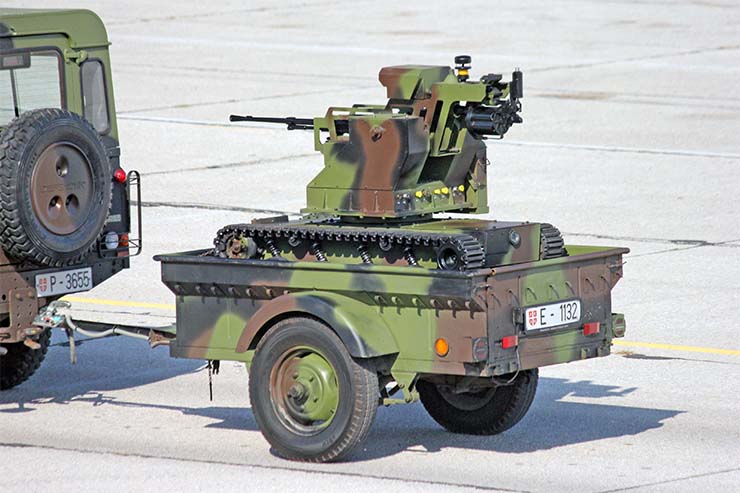
The advent of Generative Artificial Intelligence (Gen AI) in military strategy and national defence represents a significant shift toward the adoption of more sophisticated, predictive, and adaptable security mechanisms. This article seeks to unravel the complex layers of Gen AI’s deployment across military and defence operations, shedding light on its crucial impact on strategic planning, operational execution, and the broader spectrum of warfare. By weaving through various instances, let’s explore the prospective advantages, ethical dilemmas, and the challenges that accompany the integration of Gen AI into the defence infrastructure.
Generative AI has brought about a revolution in military and defence tactics, offering path-breaking advancements in intelligence analysis, decision-making processes, autonomous operations, cybersecurity measures, and training protocols. Its capability to process and interpret extensive datasets, identify underlying patterns, and adapt to evolving environments has greatly altered the operational dynamics of military organisations. These entities are now further equipped to counter threats and safeguard national security interests with a heightened level of efficiency and precision.
Generative AI functions by deploying a suite of algorithms capable of producing new data—ranging from textual content and imagery to sophisticated simulations—based on pre-existing datasets. This innovative capacity provides defence sectors with novel avenues for strategy formulation, combat training, threat emulation, and decision-making enhancement. The role of Generative AI in strengthening predictive analytics, streamlining intelligence collection, and crafting intricate scenario simulations provides a big boost for the modernisation of military capabilities. Here are some of the applications of Gen AI in military and defence:
Intelligence Analysis and Surveillance: The analysis of extensive volumes of data emanating from diverse sources, such as satellite imagery, signals intelligence ((SIGINT), and open-source intelligence (OSINT) helps in the identification of emerging trends, potential threats, and anomalies. AI algorithms uncover complex data patterns, foresee security threats, and thereby support proactive strategic planning and decision-making. Furthermore, autonomous surveillance systems, enhanced by Gen AI, are capable of monitoring expansive geographic locales, tracking mobile targets, and delivering instantaneous situational awareness to command structures.
Generative AI has brought about a revolution in military and defence tactics, offering path-breaking advancements in intelligence analysis, decision-making processes, autonomous operations, cybersecurity measures, and training protocols
Autonomous Systems and Robotics: In the area of autonomous operations and robotics, Gen AI is contributing to the evolution of systems for military use, including unmanned aerial vehicles, ground vehicles, and submersible units. These systems, guided by AI for navigation, obstacle avoidance, and target recognition, can independently explore adversarial territories to perform reconnaissance, surveillance, and logistical tasks. Moreover, autonomous weaponry, powered by Gen AI, is able to execute rapid decision-making in critical situations, thereby augmenting precision, lethality, and overall operational efficacy of military units.
Cybersecurity and Network Defence: Generative AI significantly enhances cybersecurity protocols by perpetually monitoring network infrastructures to identify vulnerabilities and pre-emptively detect cyber threats. AI-powered intrusion detection systems scrutinise network traffic to pinpoint and neutralise suspicious activities, safeguarding military communications and critical infrastructure against cyber assaults. It supports aggressive cyber threat hunting, incident response, and malware scrutiny, leading to the swift neutralisation of potential cyber attacks before they escalate.
In cybersecurity, Gen AI acts as a dual-edged sword; while it fortifies defence mechanisms against cyber threats and helps in the creation of adaptive security protocols, it can also be leveraged offensively for making cyber weapons and launching disinformation campaigns. The capacity of Gen AI to generate convincingly realistic disinformation poses profound challenges in information warfare.
Predictive Maintenance and Logistics: Through the analysis of equipment performance data, Gen AI enables the anticipation of maintenance needs and the optimisation of logistics operations. AI-driven systems enhance supply chain management, inventory control, and resource allocation, ensuring that military units are equipped with the right resources at the right time and place. Gen AI- powered predictive analytics minimise operational downtime, curtailing maintenance expenses, and bolstering overall readiness across military installations and platforms.

Strategic Decision-Making and Planning: Generative AI significantly aids in strategic decision-making and planning within military contexts. By harnessing extensive datasets, these AI frameworks can uncover latent vulnerabilities or threats, and simulate a myriad of scenarios, offering military strategists a broad spectrum of potential outcomes based on varying strategic moves. This capability fosters a deeper understanding of future conflicts, aiding in the development of both resilient and flexible strategies and counter-measures.
Enhancing Predictive Analytics for Threat Detection: By leveraging the vast reservoirs of data available through modern surveillance and intelligence-gathering technologies, Gen AI algorithms can forecast adversary actions with unprecedented accuracy. This foresight enables military strategists to devise countermeasures that are both precise and pre-emptive, significantly diminishing the potential impact of enemy operations. The utilisation of Generative AI in NATO’s cyber defence initiatives exemplifies this approach, where AI-generated simulations of cyber-attacks pave the way for the development of impenetrable cyber defences.
It is imperative to leverage Gen AI responsibly, ensuring its ethical use and security. The embedding of cutting-edge AI technologies within defence strategies demands ongoing dialogue, research, and policy evolution to harness these capabilities judiciously
Revolutionising Training Through Enhanced Simulation: AI-powered simulations allow military personnel to experience and adapt to the complex nature of modern warfare within a controlled setting. The US Department of Defence’s adoption of such technologies for creating hyper-realistic urban warfare scenarios underscores the value of Gen AI in preparing soldiers for the multifaceted challenges they will face on the battlefield.
Mounting Ethical Concerns
Though a great enabler, the integration of Gen AI into military and defence strategies also necessitates a thorough examination of its ethical implications, potential for misuse, and the critical importance of maintaining human oversight. It is imperative to leverage Gen AI responsibly, ensuring its ethical use and security. The embedding of cutting-edge AI technologies within defence strategies demands ongoing dialogue, research, and policy evolution to harness these capabilities judiciously.

The prospect of autonomous weapons systems, capable of making life-or-death decisions without human intervention, raises profound moral questions regarding accountability, the value of human life, and the potential for unintended consequences. The international discourse surrounding the deployment of Lethal Autonomous Weapon Systems (LAWS) highlights the urgent need for comprehensive ethical frameworks and international agreements to govern the use of Gen AI in warfare. It necessitates a collaborative effort among nations, defence agencies, technology developers, and ethical scholars to ensure that the deployment of these technologies enhances global security without compromising ethical standards. International cooperation is paramount in establishing norms and regulations that mitigate the risks associated with Generative AI, while harnessing its potential to protect and preserve human life.
The journey forward is laden with complex ethical considerations, technical challenges, and the imperative for international collaboration. By embracing a balanced approach that prioritises responsible use, ethical integrity, and human oversight, the global defence community can harness the full potential of Generative AI to shape a future where technology serves as a bastion of peace, security, and human dignity. As we venture into this uncharted territory, the collective wisdom, foresight, and ethical commitment of the nations will ensue that Generative AI serves the greater good of humanity, safeguarding our collective security in an increasingly uncertain world.
-The writer is an AI/ML PhD and award winning researcher and also Cyber Analytics doctoral candidate. The co-writer is an experienced R&D executive and product innovator with international exposure. Both are US-based















